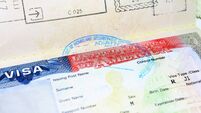Dollar hits record lows against the euro
As a result the euro reached another record high of €1.5240 against the US currency yesterday morning before falling slightly to trade within a range of €1.5186 to €1.5197.
It also hit new highs against sterling touching 76.54p yesterday afternoon, the highest level since its creation in 1999.
The fall followed new figures showing British house prices fell for the fourth month running and a weak report on consumer sentiment.
Meanwhile, oil touched a new high above $103 before moving to just under $102 a barrel. Such levels have not been seen since 1980 when oil, adjusted for inflation, peaked at $102.53.
Bad US jobless figures on Thursday plus poor growth figures showing the world’s biggest economy barely grew in the final quarter of 2007 fuelled recession worries adding to the dollar’s woes and forcing investors and speculators to buy oil as a hedge against the weakening dollar.
Analysts are forecasting the euro could hit $1.55 in the coming weeks as fears mount that the US is heading for recession, while some fear it is already there.
Those economic worries combined with warnings on the state of some small banks in the US by Fed chairman Ben Bernanke are making investors risk averse on the dollar and US equities to the benefit of low-yielding currencies like the yen and Swiss franc.
Mr Bernanke told the US Congress he expected “some failures” among small banks in America due to the financial stress of housing market woes and mortgage losses.
His comments that a weak dollar was helping to shrink the United States’ trade deficit were seen as a green light for continued dollar selling.
“The only way forward for the dollar is down as recent ranges have been broken completely,” said a senior trader at a European bank.
From a European perspective the rise in the euro will help counter oil prices and help to counter inflation .
However eurozone inflation hit 3.2 in January, which could delay any cut in bank rates by the European Central Bank. This is despite revised growth forecasts last week from the European Commission which said eurozone growth this year would fall to 1.8% from 2.2% in 2007.
The problem for the ECB is that its sole mandate is to keep inflation close to but below 2% and the latest inflation figures were heading in the wrong direction. Economists have warned the global economy could be heading for a period of stagflation where inflation rises while the economy slows and jobless figures increase.





